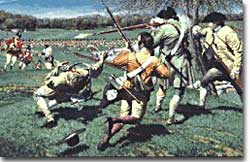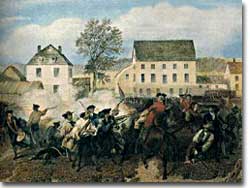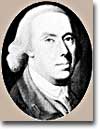The Battle of Lexington and Concord Rainbow Wolf Baby

11c. Lexington and Concord

Set up to fight at a moment's find, minutemen began fighting early on in the American Revolution. Their efforts at Lexington and Concord inspired many patriots to take up arms against U.k..
Britain's Full general Gage had a underground plan.
During the wee hours of April 19, 1775, he would send out regiments of British soldiers quartered in Boston. Their destinations were Lexington, where they would capture Colonial leaders Sam Adams and John Hancock, then Concord, where they would seize gunpowder.
But spies and friends of the Americans leaked discussion of Cuff's program.
Two lanterns hanging from Boston's Due north Church informed the countryside that the British were going to attack by body of water. A series of horseback riders — men such every bit Paul Revere, William Dawes and Dr. Samuel Prescott — galloped off to warn the countryside that the Regulars (British troops) were coming.
Regulars
It is a myth that Revere and other riders shouted, "The British are coming!" This alert would have confused a good many of the Americans living in the countryside who nonetheless considered themselves British. The Regulars were known to exist British soldiers.
| | ||
| | We set off for Concord, and were overtaken by a young gentleman named Prescot, who belonged to Hold, and was going home. When we had got about one-half manner from Lexington to Concord, the other 2 stopped at a house to awake the men, I kept along .... In an instant I saw iv of them, who rode upwards to me with their pistols in their bands, said ''Yard---d d---n you, cease. If you get an inch further, you are a dead man.'' Immediately Mr. Prescot came up. We attempted to become through them, just they kept before u.s., and swore if we did not turn in to that pasture, they would blow our brains out, (they had placed themselves opposite to a pair of bars, and had taken the bars down). They forced us in. When we had got in, Mr. Prescot said "Put on!" He took to the left, I to the correct ... Just every bit I reached it, out started vi officers, seized my bridle, put their pistols to my breast, ordered me to dismount, which I did. – Paul Revere, "Account of Midnight Ride to Lexington" (1775) | |
| | ||
Lexington and the Minutemen

The start boxing of the state of war, Lexington marked the get-go of the American Revolution. Although Lexington and Hold were considered British war machine victories, they gave a moral boost to the American colonists.
Give-and-take spread from town to town, and militias prepared to confront the British and help their neighbors in Lexington and Hold.
These Colonial militias had originally been organized to defend settlers from ceremonious unrest and attacks by French or Native Americans. Selected members of the militia were called minutemen because they could be ready to fight in a minute's fourth dimension.
Sure enough, when the advance guard of nearly 240 British soldiers arrived in Lexington, they constitute virtually seventy minutemen formed on the Lexington Green awaiting them. Both sides eyed each other warily, not knowing what to expect. Of a sudden, a bullet buzzed through the morning air.
It was "the shot heard circular the world."
Concord
 Thomas Gage was appointed commander in chief of all British forces in North America in 1763.
Thomas Gage was appointed commander in chief of all British forces in North America in 1763.
The numerically superior British killed 7 Americans on Lexington Dark-green and marched off to Concord with new regiments who had joined them. Only American militias arriving at Concord thwarted the British advance.
As the British retreated toward Boston, new waves of Colonial militia intercepted them. Shooting from behind fences and copse, the militias inflicted over 125 casualties, including several officers. The ferocity of the see surprised both sides.
Lt. Col. Smith's Report to Gen. Gage
In obedience to your Excellency's commands, I marched on the evening of the 18th inst. with the corps of grenadiers and light infantry for Concord, to execute your Excellency's orders with respect to destroying all armament, artillery, tents, &c., nerveless there, which was effected, having knocked off the trunnions of three pieces of atomic number 26 ordnance, some new gun carriages, a neat number of carriage wheels burnt, a considerable quantity of flour, some gunpowder and musket balls, with other modest articles thrown into the river. Notwithstanding we marched with the utmost trek and secrecy, we found the state had intelligence or potent suspicion of our coming, and fired many indicate guns, and rung the warning bells repeatedly; and were informed, when at Hold, that some cannon had been taken out of the town that day, that others, with some stores, had been carried three days before ....
I think it proper to observe, that when I had got some miles on the march from Boston, I discrete six lite infantry companies to march with all trek to seize the ii bridges on dissimilar roads beyond Concord. On these companies' inflow at Lexington, I understand, from the report of Major Pitcairn, who was with them, and from many officers, that they establish on a green close to the road a body of the country people drawn up in armed services society, with artillery and accoutrements, and, equally appeared subsequently, loaded; and that they had posted some men in a home and Coming together-house. Our troops advanced towards them, without whatsoever intention of injuring them, farther than to inquire the reason of their being thus assembled, and, if non satisfactory, to have secured their arms; but they in defoliation went off, principally to the left, only one of them fired earlier he went off, and three or four more jumped over a wall and fired from backside information technology among the soldiers; on which the troops returned it, and killed several of them. They likewise fired on the soldiers from the Meeting and habitation-firm. We had one human wounded, and Major Pitcairn's horse shot in 2 places. Rather earlier than this, on the route, a state man from behind a wall had snapped his piece at Lieutenants Adair and Sutherland, simply information technology flashed and did not go off. After this we saw some in the forest, just marched on to Concur without annihilation further happening. While at Concord nosotros saw vast numbers assembling in many parts; at one of the bridges they marched down, with a very considerable body, on the light infantry posted at that place. On their coming pretty well-nigh, one of our men fired on them, which they returned; on which an activeness ensued, and some few were killed and wounded. In this thing, it appears that after the bridge was quitted, they scalped and otherwise ill-treated ane or two of the men who were either killed or severely wounded, being seen past a political party that marched past presently after. At Concord nosotros found very few inhabitants in the town; those we met with both Major Pitcairn and myself took all possible pains to convince that we meant them no injury, and that if they opened their doors when required to search for military stores, not the slightest mischief would be done. Nosotros had opportunities of disarming them of our good intentions, but they were sulky; and one of them even struck Major Pitcairn. On our leaving Concord to return to Boston, they began to fire on us from behind the walls, ditches, trees, etc., which, equally nosotros marched, increased to a very bully degree, and connected without the intermission of five minutes altogether, for, I believe, up of xviii miles; so that I tin't think just it must take been a preconcerted scheme in them, to attack the King's troops the first favourable opportunity that offered, otherwise, I retrieve they could not, in so brusque a fourth dimension every bit from our marching out, take raised such a numerous body, and for then great a infinite of footing. Notwithstanding the enemy's numbers, they did not brand one gallant effort during so long an activeness, though our men were so very much fatigued, but kept nether comprehend.
– Lieutenant Colonel Smith, 10th Regiment of Foot, alphabetic character to Full general Cuff (Apr 22, 1775)
The first bloodshed at Lexington and Concord, marked the crossing of a threshold, and the momentum from these events pushed both sides further apart. Post-obit the battles, neither the British nor the Americans knew what to wait side by side.
Indignation against the British ran high in the Colonies — for they had shed American blood on American soil. Radicals such as Sam Adams took reward of the bloodshed to increase tensions through propaganda and rumor-spreading. The Americans surrounded the town of Boston, and the insubordinate army started gaining many new recruits.
During the battles of Lexington and Concord, 73 British soldiers had been killed and 174 wounded; 26 were missing. Lord Percy, who led the British dorsum into Boston afterwards the defeat suffered at Concur, wrote dorsum to London, "Whoever looks upon them [the Rebels] as an irregular mob will be much mistaken." 3 British major generals — William Howe, Henry Clinton, and "Gentleman Johnny" Burgoyne — were brought to Boston to lend their expertise and experience to the situation.
Benedict Arnold and Ethan Allen Join the Cause
Shortly after the battle, an express passenger carried the news to New Haven, Connecticut, where a local militia commander and wealthy shopkeeper named Benedict Arnold demanded the keys to a local powder house.
After arming himself and paying coin from his own pocket to outfit a group of militia from Massachusetts, Arnold and his men set off for upstate New York. He was searching for artillery that was desperately needed for the Colonial attempt and reckoned that he could commandeer some cannon by capturing Fort Ticonderoga, a rotting relic from the French and Indian War.
Upwards in the Hampshire Grants, part of modern-solar day Vermont, Ethan Allen who led a group called the Greenish Mountain Boys, also had the thought to capture Fort Ticonderoga. The two reluctantly worked together and surprised the poorly manned British fort before dawn on May 10, 1775.
The fort'south commander had been asleep and surrendered in his pajamas!
Source: https://www.ushistory.org/us/11c.asp

Post a Comment for "The Battle of Lexington and Concord Rainbow Wolf Baby"